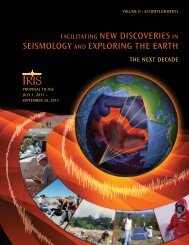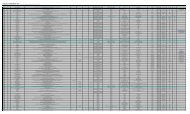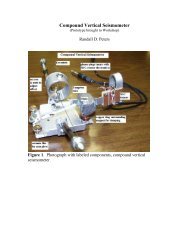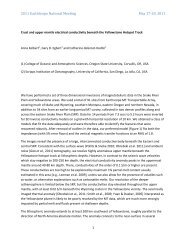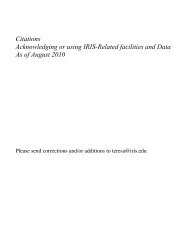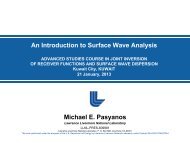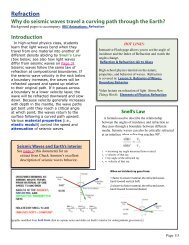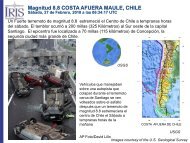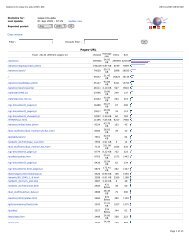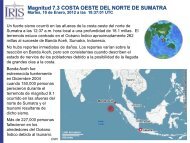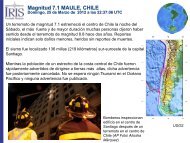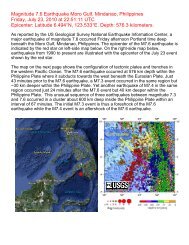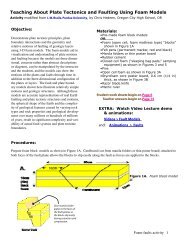Download 9.3 Mb pdf - IRIS
Download 9.3 Mb pdf - IRIS
Download 9.3 Mb pdf - IRIS
You also want an ePaper? Increase the reach of your titles
YUMPU automatically turns print PDFs into web optimized ePapers that Google loves.
4. The types and number of pieces of equipment requested<br />
for the experiment;<br />
5. An estimate of the amount of data to be gathered and<br />
archived;<br />
6. A notification of any special support which may be<br />
required;<br />
7. The name of the funding agency and status of the funding<br />
support; and<br />
8. A mailing address, email address, phone and fax numbers<br />
for the designated contact person for this experiment.<br />
Scheduling<br />
Experiments which receive funding after January 1 will be<br />
entered into the schedule so as not to interfere with previously<br />
approved experiments. Requests can be made for<br />
instruments at any time during the year, and they will be<br />
made available to users as the schedule permits. If an experiment<br />
can not go in its allocated slot for some reason it goes<br />
to the back of the line unless:<br />
1. The PI’s in affected experiments voluntarily agree to delay<br />
or modify the experiment schedule, or<br />
2. The applicable NSF and/or DOE Program Manager(s)<br />
decides that the delayed experiment takes priority over<br />
one of their subsequent experiments.<br />
The schedule is determined in the fall of each year for the<br />
next year. If conflicts exist, a committee of impartial members<br />
from the PASSCAL Standing Committee along with<br />
any interested representatives from the National Science<br />
Foundation will meet to make the final determinations. Only<br />
experiments with established funding will be entered into<br />
the schedule. Priorities will be set in the following order:<br />
1. Programs funded by the Earth Sciences Division of<br />
NSF or by the Office of Nonproliferation Research &<br />
Engineering of the Department of Energy;<br />
2. Programs funded by other divisions of NSF;<br />
3. Programs funded by other US government agencies; and<br />
4. Other programs.<br />
All other conditions being equal, the highest priority will<br />
go to experiments with the earliest funding dates, then the<br />
earliest request dates. The goal of the scheduling is to optimize<br />
the use of the instruments, and accommodate as many<br />
experiments as possible. Therefore, it is sometimes necessary<br />
to negotiate with the PI the exact type and number of instruments<br />
or to move the scheduled time of the experiment.<br />
<strong>IRIS</strong> will publish the schedule for the coming year as soon<br />
as the committee recommendations are completed and<br />
approved by the President of <strong>IRIS</strong>. Once the experiment<br />
has been scheduled, the PI will be contacted to work out<br />
the details about the exact type of equipment, the ancillary<br />
equipment and the field support personnel who will be<br />
assigned to the experiment. At this point the PI will also<br />
have to start working with PASSCAL to provide information<br />
to the Data Management System about the experiment and<br />
the data delivery.<br />
55<br />
Principal Investigator<br />
Commitments<br />
Investigators borrowing instruments will be required to meet<br />
the following conditions:<br />
1. Copies of all data sets acquired with the instruments will<br />
be made available to the <strong>IRIS</strong> Data Management Center<br />
in accordance with the PASSCAL Data Delivery Policy.<br />
The delivery of the data is considered the equivalent of<br />
delivery of a final report.<br />
2. The PI and key experiment personnel are required to<br />
attend an Experiment Planning Session at the PASSCAL<br />
Instrument Center. At this session they will work with<br />
the PASSCAL personnel to finalize the operational plans<br />
for the experiment and receive training on the recording<br />
instruments and the field computers. This is necessary<br />
even for a repeat users, as equipment and software are<br />
being upgraded continuously.<br />
3. Experiments should budget to pay travel expenses for<br />
personnel from the PASSCAL Instrument Center to<br />
accompany the equipment to the field to insure that the<br />
equipment is functioning properly and to provide additional<br />
in-field training to the experiment personnel. This<br />
personnel support, which can be requested by the PI or at<br />
the discretion of PASSCAL, is intended to be short-term<br />
support to insure that the experiment can start collecting<br />
useful data in a timely manner. Experiments with very<br />
large numbers of instrument (> 100) or other special



